This post is part of a community writing project called “Enchanted by a Book,” hosted by Quiet Reading with Tara Penry. In July 2024, Substack writers are joining together to spread the joy and revelation of reading and the unique experience of every reader with a book or a story or a poem. Find a complete list of participants at the project home page, where new links are appearing all month.
Let me talk for a minute about the Library of Alexandria. When I first learned about it, I was a graduate student, in love with reading since the age of four and now getting trained in the skill of close reading. In my program we studied texts of the ancient Mediterranean world—religious texts, scriptures. I was learning to dig in to each sentence, to catch allusions to other texts and track them to their source.
One day I happened to read that the Library of Alexandria, maybe the largest collection of texts in the ancient world, had been burned by a mob of rioting Christians.
My heart hurt.
By that point I’d already studied ancient Greek.1 I knew the incalculable wealth those papyri and scrolls must have held—medicine and poetry, commentaries and criticism. I could almost hear the thunder of those hellish flames. I grieved for the loss.
Except that the story of the fire turned out to be more myth than fact, though I wouldn’t learn this for many years. By the time the mob went after that library, during the last gasp of the Roman Empire, it had been in decline for centuries, its contents long scattered.
Still, to this day, mention the Library of Alexandria, and my ears perk up. I make a mental note: you’re one of mine.
Much later in life my partner, Tim, and I moved to Placitas, New Mexico, a suburb of Albuquerque rising out of the desert sands. It’s a place where great horned owls perch on housetops and hoot into the night, and the yipping of coyotes swells in a chorus just beyond the lights of the last house.
Tim stays up late, so he was always the one who took our pup out for his last walk of the evening. And so Tim was always the one who met up with the scorpions.
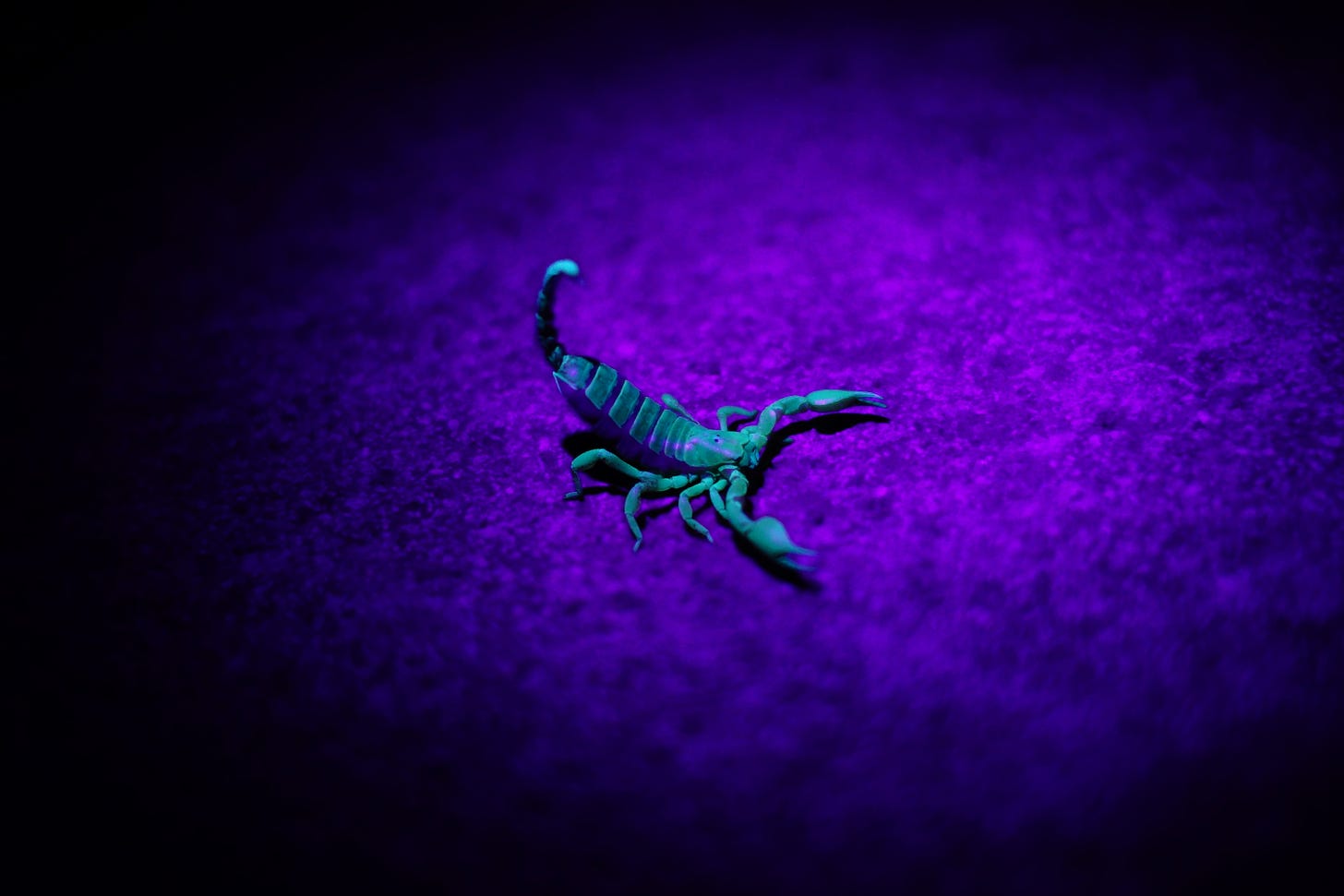
I would hear about it the next day—how he opened the front door to step into the night, and there in the middle of the porch was a scorpion. How he always managed to shoo them back into the shadows, and neither he nor the pup ever got stung. But Tim is glad we live in the tropics now, on an island far away from scorpions, and he announces this regularly out of the blue.
I saw a scorpion once too in New Mexico and could barely stay still long enough to observe, so strong was my urge to flee.
Here in Hawaiʻi, the closest I get to a scorpion is a scorpionfish—lots of scorpionfish, so many kinds I haven’t begun to learn them all. We come across them on the reef—big bulgy ones hiding in plain sight on a rock. Some of them cradle rainbows in their fins—arcs of scarlet, orange, and yellow—and will flash them if you get too close. Others are small and smooth and rest upside down in the arms of cauliflower coral. But all of the scorpionfish carry those fearsome spines on their backs, packing venom. We keep our distance.
Which is all to say that when I came across a poem by Brigit Pegeen Kelly, a poet I’d never heard of, and I met up with the scorpions and scorpionfish in the poem, I felt right at home.2
The poem is “Closing Time; Iskandariya,” and even as I read it, I knew it was “strange and puzzling,” as others have said. But maybe because of those fish and scorpions, I felt compelled to keep reading.
And since finding this poem I am obsessed with it. I’m like the poet who said of this same poem, “It just won’t let me be.”
It won’t let me be either. I want to stay immersed in it. The depths of it grow more wondrous the longer I swim in them. Like the ocean, it won’t let me go.
So after living with this poem intensely for a couple of weeks, I want to share a few of its wonders.
Right away in the opening line, we meet the fish and the scorpion:
It was not a scorpion I asked for, I asked for a fish,
The rest of the poem tells a story about her relationship with the scorpion, and I had been enjoying the story for days when I noticed something I couldn’t believe I’d missed—me, trained in close reading, especially of scriptures.
The first line of this poem is an allusion to a famous saying of Jesus.
When Jesus was teaching his followers to pray, he urged them to just “Ask and it will be given to you.” Because God is like a father, he said, and even human ones know how to give good things to their children. “Which of you fathers,” he said, “if your son asks for a fish, will give him a snake instead? Or if he asks for an egg, will give him a scorpion?” (Luke 11:9–12 NIV). Ask for what you want, he was saying, and it will come.
Except for most of us it doesn’t go that way most of the time. And this poem is about those times. And here in the first line is the problem: She asked for a fish; she got a scorpion instead.
So what do most of us do when life doesn’t send us what we want but serves up something harder instead? Usually we ask why. And usually the questions start by focusing on God, or reality. Why did this bad thing happen? Is God good? Can the universe be trusted? The history of sacred texts is all about trying to make sense of a universe that doesn’t follow our wishes.3
In this poem, the speaker too is asking about God—is he good? Right away she answers yes, but there’s a catch. Listen to the whimsy in these next lines:
but maybe God
misheard my request, maybe God thought I said not "some sort of
fish," but a "scorpion fish," a request he would surely have granted,
being a goodly God, but then he forgot the "fish" attached to the
"scorpion" (because God, too, forgets, everything forgets);
And instantly I’m charmed. The poet lets God off the hook! Maybe God just forgot—don’t we all? Her God is like us: prone to mishearing, forgetting.
And I think of that song: “What if God were one of us? . . . Just a stranger on the bus / Trying to make his way home.” In this poem God is one of us. God is just like us, which of course implies the opposite: we are just like God. Even our forgetting is holy.
So if God wasn’t the reason she didn’t get her fish, what happened? Most people, in fact, don’t want God to be the problem, because believing reality can be malevolent is disabling; it’s a real soul killer. So then people often scrutinize themelves: Did I ask for the wrong thing? Or didn’t I ask in the right way?
And the poet too wonders if there was something wrong with her request: Maybe it sounded too picky, so it could be easily misunderstood. But right away she knows that’s not the problem; she wasn’t at fault either. After all, she would have been happy with any kind of fish! Just listen to this list of them:
so
instead of an edible fish, any small fish, sweet or sour, or even the
grotesque buffoonery of the striped scorpion fish, crowned with
spines and followed by many tails, a veritable sideshow of a fish;
instead of these, I was given an insect,
And I’m charmed, again, by the mention of a scorpionfish. I’ve never seen a striped scorpionfish, so I hurry off to look up pictures, and they really do look like a sideshow.
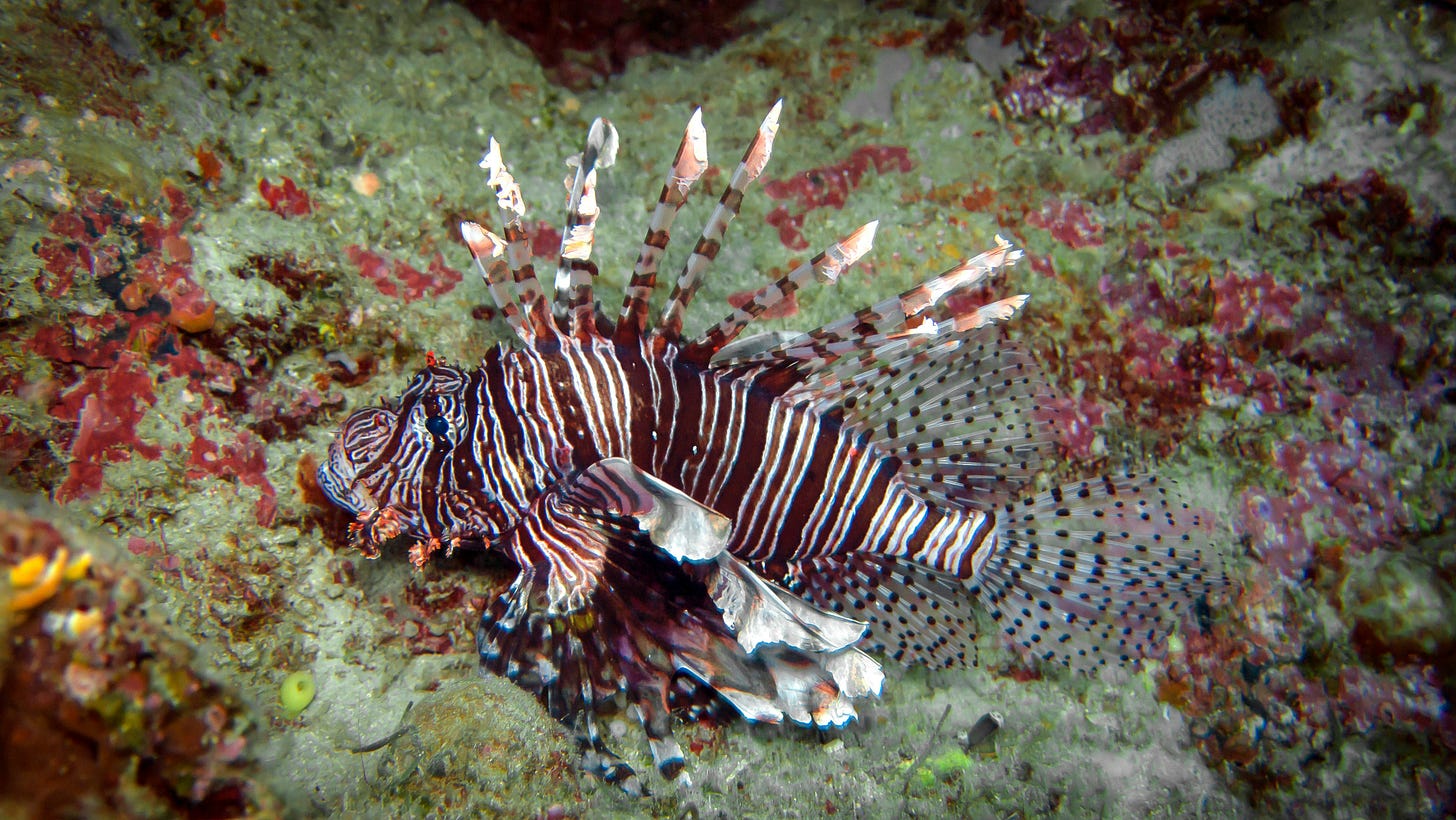
But the poet asked for a fish, and she got a scorpion, and she’s not at all happy about it. In fact, she’s appalled. Most of us usually are.
So she takes a long hard look at this thing she’s been given, and everything she sees is ugly. She describes the scorpion in great detail, with the exactness of a field guide—and every bit of it looks, to her, repulsive. Just listen:
a peculiar prehistoric
creature, part lobster, part spider, part bell-ringer, part son of a
fallen star, something like a disfigured armored dog, not a thing
you can eat, or even take on a meaningful walk, so ugly is it, so
stiffly does it step, as if on ice, freezing again and again in mid-air
like a listening ear, and then scuttling backwards or leaping madly
forward, its deadly tail doing a St. Vitus jig.
The “son of a fallen star” here is another biblical allusion—to the story of Satan, who became the great adversary after his cosmic fall from grace. And the St. Vitus jig is a horrifying illness that disables people with fever and shaking, and I happen to know about it because I had a cousin in high school who nearly died from it, and it was truly terrifying.
But as the poet watches this scorpion, this deadly adversary, something happens. The edges of her horror start to soften. Old myths about scorpions begin to melt. Watch the transformation happening here:
God gave me a
scorpion, a venomous creature, to be sure, a bug with the bite of
Cleopatra's asp, but not, as I soon found out, despite the dark
gossip, a lover of violence or a hater of men. In truth, it is shy, the
scorpion, a creature with eight eyes and almost no sight, who
shuns the daylight, and is driven mad by fire, who favors the lonely
spot, and feeds on nothing much, and only throws out its poison
barb when backed against a wall
She begins to see more clearly. She starts to take in the scorpion’s point of view. And right away the pronouns for the scorpion change, still a “thing” but a “thing who,” a being “who” has wishes and needs. The scorpion is coming alive for her. If this poem were about a human being, we’d say she is humanizing the other, seeing through the fog of preconception, finding commonality.
Then right on cue, as soon as she begins to understand who the scorpion really is, she sees it: we are similar!
— a thing like me, but not the
thing I asked for, a thing, by accident or design, I am now attached
to. And so I draw the curtains, and so I lay out strange dishes, and
so I step softly, and so I do not speak, and only twice, in many
years, have I been stung, both times because, unthinking, I let in
the terrible light.
It’s a breakthrough; she can now identify with the other, this thing that she’s attached to. I love the choice of that word attached, the ambiguity of it. She’s been thrown together with this one and is bound to them. But she is also accepting their presence, maybe becoming attached in the heart way.
She moves softly and learns to respect the scorpion’s wishes. She accommodates and shifts her own habits to make room. She allows the other to change her. She finds her kuleana, as we say in Hawaiʻi, her responsibility, which really means her ability to be responsive to another. She comes fully into relationship.
And in the very next lines the scorpion turns at last from “it” to “he”:
And sometimes now, when I watch the scorpion
sleep, I see how fine he is, how rare, this creature called Lung Book
or Mortal Book because of his strange organs of breath.
I hurry to the web to learn about Book Lung, and what I find there is astonishing—how spiders and scorpions and a few crabs get their oxygen, and it’s just as amazing as the poem describes here:
His lungs
are holes in his body, which open and close. And inside the holes
are stiffened membranes, arranged like the pages of a book
— imagine that! And when the holes open, the pages rise up and
unfold, and the blood that circles through them touches the air, and
by this bath of air the blood is made pure . . .
She is in awe of him now. The old revulsion has been washed clean away. A sense of wonder fills her heart.
And then the coup de grâce, the final lines of the poem like a blow aimed straight for my own heart:
He is a house of books,
my shy scorpion, carrying in his belly all the perishable
manuscripts — a little mirror of the library at Alexandria, which
burned.
And when she invokes the Library of Alexandria, I know for sure: this poet is one of mine.
The first days I lived with the poem, I read it as being about all the things in life we don’t choose—rotten luck, challenging circumstances, illness, loss. I thought about my own illness in my early thirties and what an adversary it was, knocking me right out of the life I wanted, but how my feeling about it softened over the years—how grateful I am now for the changes it brought about in me.
Yet there’s another layer of the poem too, and this one opened up as I learned about the title of the poem and where it was published.
This poem came out in the New York Times in 2005. It was published as, of all things, an opinion column. So it seems like the piece was intended to communicate something about current events. And I have to say, this might be one of the most profound opinion pieces I’ve read in a paper, ever.
Because in 2005 the Second Iraq War was in full swing. Three years earlier, millions of people had marched around the world against the US invading Iraq—fifty thousand on one day alone in San Francisco, where I joined in. But the Bush administration4 had pushed on, heedless, invading and then occupying Iraq. By 2005 the war looked endless, with daily news reports droning on about roadside bombs and troops killed.
And in the middle of this bleak landscape of war, Brigit Pegeen Kelly offered an opinion piece, a poem set in, of all places, Iraq. The Iskandariya of the title is Al-Iskandariya, or Alexandria, a city in central Iraq. Is it a coincidence that the US military held an operating base there? This Alexandria lies in enemy territory, and it opens a poem that ends with the Alexandria of ancient Western wisdom—one Alexandria a “mirror” of the other, which leads me to wonder in just how many ways the poet was trying to jar us out of old prejudices. The “Closing Time” of the title also calls to mind the fatigue we felt about the war—what could possibly bring it to a close?
The poem answers this question with a story of transformation. It’s a story of making peace—with an insect, in this case, a creature of the desert (like our adversaries?), a creature often hated and reviled. The poet has to live with him a long time—many years, the poem says—before she sees his value.
This poem shows us the pathway out of hate. It’s a path that begins by dispelling old myths of otherness and learning to see the other more truthfully. This is always a humbling process—bending ourselves to reality, being willing to see who another really is instead of clinging to old prejudice. The pathway leads, if we allow it, to accepting the other at last as a person, a whole person, with needs and preferences equal to our own. And at the end of this path, the poem says, we might awaken to wonder and awe and love.
Today the poem may be even more urgent than before. Many today are trafficking in a hate that finds enemies not just halfway around the world but also here at home among the most vulnerable people. The pathway out of hate remains the same: clearing away “dark gossip” and coming to see the other as worthy of respect, worthy of care.
And the poem is urgent in light of the even bigger campaign that we as a species are still waging: against the Earth. We still treat the Earth as an adversary to be brought under our control with pesticides and clearcutting. We still put human needs first, forgetting that our survival depends on the health of this delicate interweb of beings, which by definition means that the needs of every other kind of creature have an importance equal to our own.
We have fallen out of relationship.
Which is why Kelly’s poem is so urgent, and is still a profound and radical opinion piece. It outlines the pathway to peace, which is nothing less than the process of coming into relationship. Humbling ourselves to, first, see the other, and then to see them clearly. Making room for their presence. Learning to respect their habits. And above all, allowing our view of them to change from an “it” to a “who.”
Being in relationship is the only path that will save us. Taking up our kuleana, our responsibility to give as well as take, because we can accept our place in a circle of creation where all of us matter and all of us are creating a future we will share. The path of relationship is a path that shows us how to act differently. Making peace with the living others of this Earth is the way to build a different kind of world.
The kuleana of relationship is waiting—the joy of being responsive to the others of the Earth.
Here’s to reveling in our relatedness. Here’s to reconciling with Earth.
Music today by The Wong Janice, “Fear (10-Minute Meditation),” Cello Music for Meditation (2019).
You can hear the poem in its entirety, with music, at the end of the podcast, beginning at 22:30.
How do you respond to this poem? What reactions does it raise in you? Any questions it leaves you with? Maybe you hear it a completely different way! Let us know in the comments.
And don’t forget to press the Like button!
Koiné Greek, the language of the early Christian texts.
Huge thanks to Devin Kelly and his luminous close reading of a poem, or three, every Sunday morning! I learned of this poem from his July 7 post.
The history of science is too.
George W.


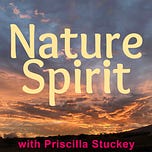


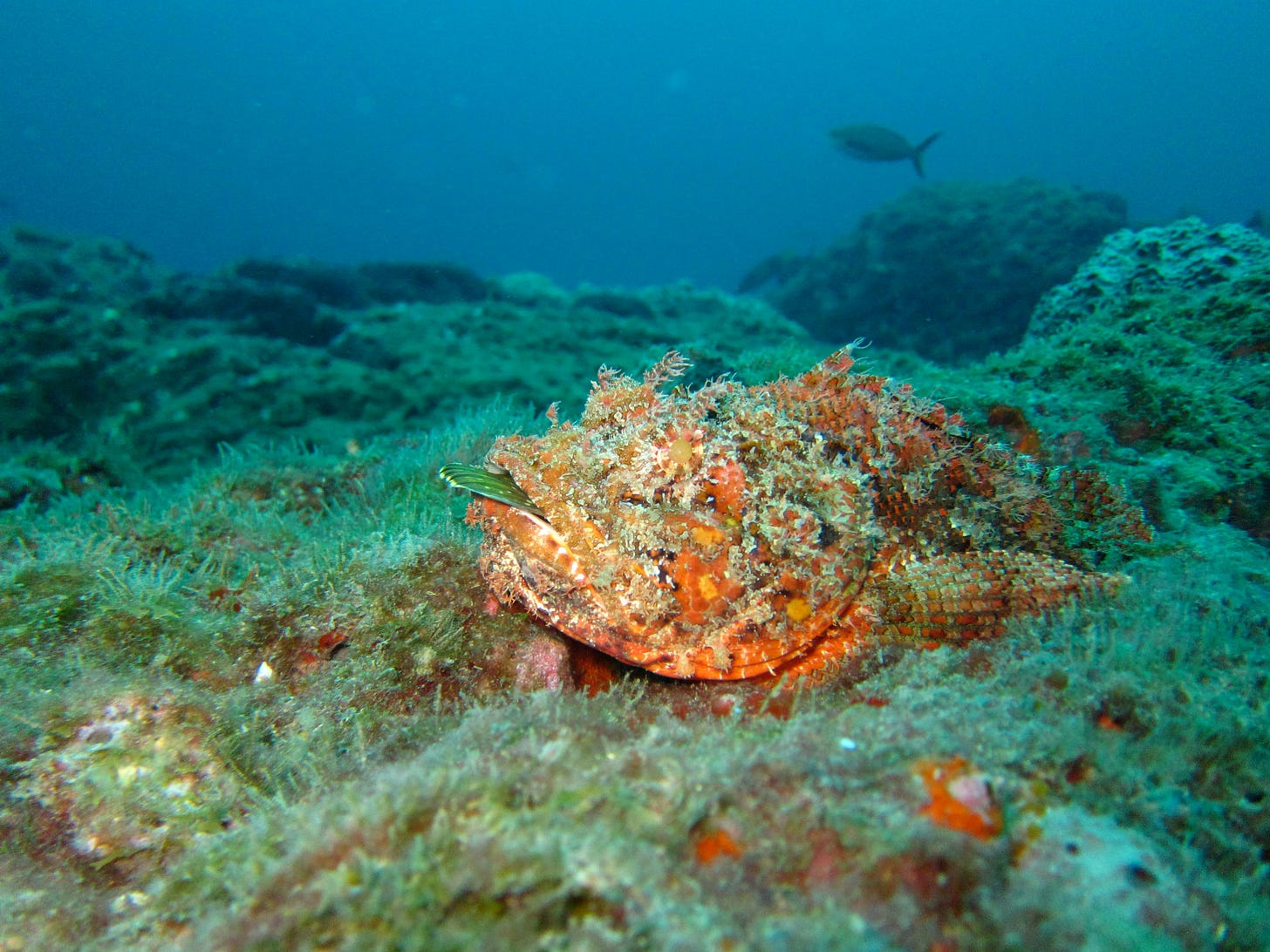








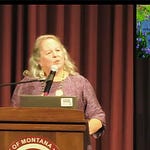

51. Like the Ocean, It Won’t Let Me Go